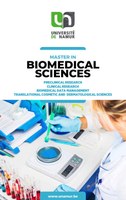C a r e e r o p p o r t u n i t i e s
Biomedical Sciences can lead to many different careers, mainly in the area of research, either basic or applied. This research is carried out at universities, university hospitals, government agencies (e.g. public health institutes, drug and health product agencies, health policy bodies, etc.), and in laboratories in the biopharmaceutical, biotechnological, nutrition,cosmetics and medical equipment sectors.
Basic biomedical research aims to understand, via an experimental approach, how the human being works at the level of cells and molecules. Its conclusions may one day lead to clinical applications.
Applied biomedical research puts into practice the advances made in basic research. Its objective is to improve the way conditions are diagnosed and treated. For example, it might aim to design new vaccines or new diagnostic tests. It also paves the way for careers in the pharmaceutical or cosmetics industries.
Clinical research management involves the setting up and coordination of clinical trials in hospitals, clinical
research organisations and the biopharmaceutical industry, and can lead to the following careers:
- clinical trials assistant - assists investigating doctors in carrying out clinical trials;
- clinical project manager - executes the clinical trial development plan, in accordance with regulations and deadlines;
- clinical research associate - sets up and monitors the clinical trials in a particular project, whilst ensuring the quality of the data gathered in compliance with regulations;
- data manager - manages the processing of data obtained in the context of the clinical trial.
As well as research, the clinical sector offers a large number of other career paths: toxicology, nutrition, clinical biology, bioengineering, medical imaging, etc., as well as medical data management.
Biomedical Sciences can also lead to many other opportunities in the fields of research and development, production, insurance and quality control, regulatory affairs, intellectual property, consultancy, medical representation, teaching, and so on.
Finally, the Master in Biomedical Sciences allows you to further your studies in the third cycle (Doctorate) or to take an interuniversity certificate in Health Product Regulatory Affairs, offered jointly by UNamur and ULiège.










